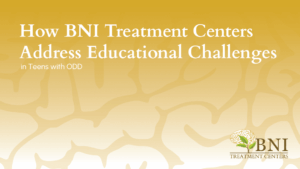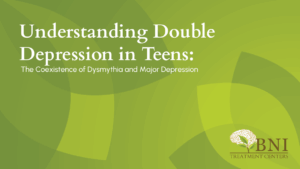Trauma is an emotional and psychological response to serious events, often leading to significant distress and pain. It can be challenging to recognize in children and teenagers because they don’t show it as much as adults do. Yet, teens are the most vulnerable. According to the National Institute of Mental Health, approximately 1.5% of American teens with PTSD are seriously impaired by their trauma symptoms. Girls are at a higher risk than boys of developing trauma symptoms.
Sometimes, trauma serves as a response to a negative event that causes emotional, mental, and psychological harm. Domestic violence, child or sexual abuse, accidents, natural disasters, or the death of a loved one can leave a mark on the individual’s psyche, causing them to be traumatized. How can this be treated, and above all, how can you know one has a trauma?
BNI Treatment Centers offers mental health treatment for teens in Southern California. Contact us today to learn more about how our Agoura Hills IOP center for adolescents.
Causes of Trauma in Teens
Trauma becomes evident when the person can’t cope with the distressing events experienced. It may lead to long-term psychological effects. A singular event could cause trauma in teenagers in many cases. It’s also possible to see multiple or a chain of traumatic events affect a person’s mental and emotional health.
Some of the most common trauma for adolescents and teenagers include;
- Physical or sexual abuse: Adolescents who experience physical or sexual abuse can develop severe trauma that may not heal unless admitted into a therapy program.
- Neglect: This can also profoundly impact the person’s well-being. Teenagers whose primary care and support from family are unmet can develop damaging trauma.
- Persistent bullying is another common cause of trauma. Repeatedly subjected to online and offline verbal attacks or physical abuse can result in lasting distress.
- Severe accidents: Serious accidents or injuries, such as automobile crashes or building collapses, can lead to trauma.
- Violent neighborhoods: Living in communities with an astronomical level of violence can cause teen trauma. The fear of being killed can have a lasting effect.
- Loss: The death of a loved one can lead to a profound sense of loss, which affects the individual’s well-being.
- Domestic violence: Witnessing fighting or hostility among parents can be highly traumatic for teenagers.
- Medical conditions: Chronic illnesses or invasive operations can cause distress that contributes to trauma.
- Natural disasters: Experiencing earthquakes, floods, or wildfires, can be traumatic for adolescents. Traumatic events can have a lasting psychological effect.
Signs of Trauma in Teens
Signs of trauma in teenagers differ from person to person. Some symptoms are associated with a specific trauma, while others are present in all. These symptoms into short-term and long-term symptoms. Short-term signs include:
- Feelings of emptiness
- Clinging to people they are comfortable with
- Low self-confidence
- Behavioral and emotional changes
- Nightmares
- Eating disorders
- Substance use disorder
- Refusing to speak
Long-term signs include:
- Anxiety and depression
- Avoiding places associated with the event
- Aggression
- Poor school performances
- Loss of interest in activities that you once enjoyed
- Increased sexual activity
The signs of trauma in adolescence may not develop at once but occur over time. They may also vary depending on the teenager’s traumatic events. If you or someone you know has any of the above signs, seek professional help. Therapy and counseling can help teenagers heal and recover from the trauma.
Treating Teen Trauma Symptoms
Fortunately, families have various options for managing and treating teenage trauma. With these adolescent treatment options, some patients can recover in a few weeks, while others may recover after a few months to a year.
Counseling is one of the treatment methods. It provides a safe and comfortable space where patients can discuss their emotional trauma without judgment. Depending on the severity of the case, this may require one-on-one or group sessions.
Therapy is the next option. The most common type for treating trauma is Cognitive-behavioral Therapy (CBT). This helps the person identify and change negative thought patterns that influence their emotion and mental health.
Another effective form of therapy for managing trauma in teens is Prolonged Exposure Therapy (PET). This manages trauma by exposing patients to their fears and allowing them to face them. For example, if a teen is involved in a car crash and has a phobia for vehicles, PET helps the patient to learn to sit in a car for some minutes. This is gradual until the patient overcomes the fear of moving in vehicles.
With adequate support from parents/ guardians and counselors, teenagers can recover from problems associated with traumatic events. They can also re-establish connections with activities and people and live normally.
BNI Treatment Center Can Help Alleviate Trauma Symptoms
The importance of treatment can’t be overemphasized. How a parent responds to their teenager’s trauma can dramatically impact their future. Without proper help, a trauma may haunt the teenager forever and cause lasting psychological impact. Therefore, you need to contact a healthcare center like BNI to help alleviate the signs of trauma in teens.
BNI is a well-equipped trauma and mental health center that offers counseling and therapy services to manage teenage trauma. We recommend the best approach based on our evaluation and discussion with the client. This helps us to implement the best strategy to ensure lasting recovery.
Contact our Agoura Hills teen PHP treatment center today to learn more.




